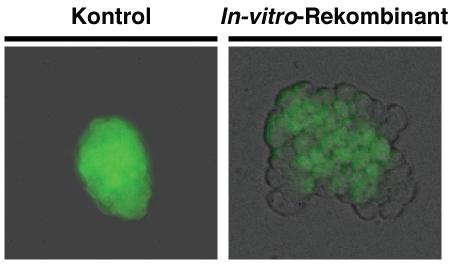Breaking species barriers by “breeding” mice in a dish

Mouse embryonic stem cell colonies labelled with green fluorescent protein under standard growing conditions are typically uniform. In contrast, stem cell colonies grown under an in vitro recombinatio Photo credit: Stefano Lazzarano
Since the Antiquity, scientists have long wondered what lies at the root of the difference between species. Today, biologists are able to decode genomes, track genes turning themselves on and off and even move and insert genes from one species to another.
Yet, the answer to the question of which gene mutations make, say, a house mouse different from its wild relatives remains stubbornly elusive. This is because genetic analyses like those undertaken a century ago by Mendel required extensive breeding to mix up the genomes. But mixing across species like cross-breeding horses and donkeys tend to only give sterile offspring because encoded into the DNA of every species are many genetic barriers that prevent mixing through hybridization.
Using advanced stem cell techniques and clever genetic manipulations, researchers in the Chan Lab at the Tübingen Friedrich Miescher Laboratory have found a way to shuffle the genomes in hybrid mice. More surprising yet, they have done so entirely in a petri dish, without breeding any animals.
The Tübingen team achieved this breakthrough by carefully manipulating cell divisions in hybrid embryonic stem cells with a drug against a gene called Bloom Syndrome that is normally responsible for DNA unwinding. This in turn causes shuffling or mitotic recombinations between the divergent copies of mouse chromosomes from different species.
To show that this technique worked, the FML team investigated the difference between the laboratory Mus musculus musculus mouse and its sister species the Algerian mouse Mus spretus. One known difference is that Mus spretus are much faster at metabolizing a drug called tioguanine, likely due to their copy of a gene called Hprt. The Chan Lab decided to apply the new in vitro recombination technique to recover the gene responsible for metabolizing tioguanine.
After having shuffled the hybrid genomes, the Chan Lab used a cell sorter, in which millions of cells were individually measured using an intricate set of lasers, mirrors and detectors in thousandths of a second for their ability to survive by-products of tioguanine breakdown. Then by sequencing the DNA of these cells, the FML team found many more M. spretus copies of Hprt than the Mus domesticus variant among the tioguanine susceptible cells. This was resounding confirmation that in vitro recombination can be used to pin-point species differences.
Most impressively, this whole mapping experiment only took three weeks to perform, about as long as it takes for a single mouse to be born through breeding.
Using stem cells, advanced sequencing, and transgenic techniques, Chan and co-workers have shown the path forward for a completely new type of genetic studies. With this new in vitro recombination technique, gene differences in mammals like mice can be directly mapped in a safe, fast and reliable manner.
This technique also removes much breeding, thus helping to reduce the large number of experimental animals. Importantly, the same technique, applied to human cells, has the potential to improve medicine and treatments. By mixing the hybrid genomes, the Tübingen researchers offer new insights into genome function that can lead to advances in our fundamental understanding of species differences and disease.
Original Publication:
Lazzarano et al., Genetic mapping of species differences via in vitro crosses in mouse embryonic stem cells. Proc Nat Acad Sci, 2018. doi: 10.1073/pnas.1717474115
Contact:
Frank Chan
Phone: +49 7071 601 888
E-mail: frank.chan@tue.mpg.de
Sarah Hailer (PR Officer)
Phone: +49 7071 601- 444
E-mail: presse-eb@tuebingen.mpg.de
About us:
The Max Planck Institute for Developmental Biology conducts basic research in the fields of biochemistry, genetics and evolutionary biology. It employs about 350 people and is one of four Max Planck Institutes located at the Max Planck Campus in Tübingen. The Max Planck Institute for Developmental Biology conducts basic research in the areas of biochemistry, molecular biology, genetics, cell- and evolutionary biology. It does not develop genetically modified crops. It is one of 83 research institutes that the Max Planck Society for the Advancement of Science maintains in Germany.
The Friedrich Miescher Laboratory (FML) was founded in 1969 by the Max Planck Society for the Advancement of Science. It provides outstanding young researchers the opportunity to establish a research group over a period of several years, to realize own ideas, and to start an independent career. Over 50 employees work currently at the FML within four research groups. The FML works closely together with the Max Planck Institutes for Developmental Biology and Biological Cybernetics, all situated at Max Planck Campus in Tübingen.
Media Contact
More Information:
http://www.fml.mpg.deAll latest news from the category: Life Sciences and Chemistry
Articles and reports from the Life Sciences and chemistry area deal with applied and basic research into modern biology, chemistry and human medicine.
Valuable information can be found on a range of life sciences fields including bacteriology, biochemistry, bionics, bioinformatics, biophysics, biotechnology, genetics, geobotany, human biology, marine biology, microbiology, molecular biology, cellular biology, zoology, bioinorganic chemistry, microchemistry and environmental chemistry.
Newest articles

“Nanostitches” enable lighter and tougher composite materials
In research that may lead to next-generation airplanes and spacecraft, MIT engineers used carbon nanotubes to prevent cracking in multilayered composites. To save on fuel and reduce aircraft emissions, engineers…

Trash to treasure
Researchers turn metal waste into catalyst for hydrogen. Scientists have found a way to transform metal waste into a highly efficient catalyst to make hydrogen from water, a discovery that…

Real-time detection of infectious disease viruses
… by searching for molecular fingerprinting. A research team consisting of Professor Kyoung-Duck Park and Taeyoung Moon and Huitae Joo, PhD candidates, from the Department of Physics at Pohang University…





















